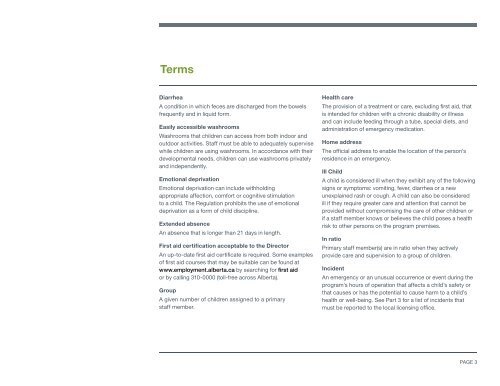child-care-licensing-handbook
child-care-licensing-handbook
child-care-licensing-handbook
Create successful ePaper yourself
Turn your PDF publications into a flip-book with our unique Google optimized e-Paper software.
Terms<br />
Diarrhea<br />
A condition in which feces are discharged from the bowels<br />
frequently and in liquid form.<br />
Easily accessible washrooms<br />
Washrooms that <strong>child</strong>ren can access from both indoor and<br />
outdoor activities. Staff must be able to adequately supervise<br />
while <strong>child</strong>ren are using washrooms. In accordance with their<br />
developmental needs, <strong>child</strong>ren can use washrooms privately<br />
and independently.<br />
Emotional deprivation<br />
Emotional deprivation can include withholding<br />
appropriate affection, comfort or cognitive stimulation<br />
to a <strong>child</strong>. The Regulation prohibits the use of emotional<br />
deprivation as a form of <strong>child</strong> discipline.<br />
Extended absence<br />
An absence that is longer than 21 days in length.<br />
First aid certification acceptable to the Director<br />
An up-to-date first aid certificate is required. Some examples<br />
of first aid courses that may be suitable can be found at<br />
www.employment.alberta.ca by searching for first aid<br />
or by calling 310-0000 (toll-free across Alberta).<br />
Group<br />
A given number of <strong>child</strong>ren assigned to a primary<br />
staff member.<br />
Health <strong>care</strong><br />
The provision of a treatment or <strong>care</strong>, excluding first aid, that<br />
is intended for <strong>child</strong>ren with a chronic disability or illness<br />
and can include feeding through a tube, special diets, and<br />
administration of emergency medication.<br />
Home address<br />
The official address to enable the location of the person’s<br />
residence in an emergency.<br />
Ill Child<br />
A <strong>child</strong> is considered ill when they exhibit any of the following<br />
signs or symptoms: vomiting, fever, diarrhea or a new<br />
unexplained rash or cough. A <strong>child</strong> can also be considered<br />
ill if they require greater <strong>care</strong> and attention that cannot be<br />
provided without compromising the <strong>care</strong> of other <strong>child</strong>ren or<br />
if a staff member knows or believes the <strong>child</strong> poses a health<br />
risk to other persons on the program premises.<br />
In ratio<br />
Primary staff member(s) are in ratio when they actively<br />
provide <strong>care</strong> and supervision to a group of <strong>child</strong>ren.<br />
Incident<br />
An emergency or an unusual occurrence or event during the<br />
program’s hours of operation that affects a <strong>child</strong>’s safety or<br />
that causes or has the potential to cause harm to a <strong>child</strong>’s<br />
health or well-being. See Part 3 for a list of incidents that<br />
must be reported to the local <strong>licensing</strong> office.<br />
PAGE 3


